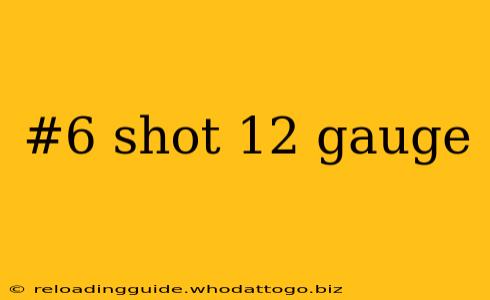The 12-gauge shotgun remains a popular choice for various applications, from hunting and sport shooting to home defense. Within the 12-gauge family, the 6-shot configuration offers a unique balance of capacity and manageability. This comprehensive guide will delve into the characteristics, uses, advantages, and disadvantages of 6-shot 12-gauge shotguns.
Understanding 6-Shot 12 Gauge Shotguns
A 6-shot 12-gauge shotgun refers to a firearm chambered in 12-gauge and capable of holding six rounds of ammunition in its internal magazine or tube. This contrasts with traditional pump-action or semi-automatic shotguns that often boast higher capacities, or with single-shot models. The "6-shot" designation usually points towards specific models or variations within a manufacturer's lineup, rather than a universally standardized feature.
Advantages of a 6-Shot 12 Gauge
-
Manageability: The reduced capacity compared to higher-capacity shotguns often translates to a lighter and more easily handled firearm, particularly beneficial for smaller individuals or those new to shotguns. This improved handling can lead to better accuracy and faster target acquisition.
-
Reduced Recoil: While not directly related to the shot count, the lighter weight associated with some 6-shot models can contribute to reduced felt recoil compared to heavier, higher-capacity shotguns.
-
Reliability: Simpler designs, often found in 6-shot shotguns (especially those with pump-action mechanisms), can translate to increased reliability and reduced potential for malfunctions.
-
Cost-Effectiveness: In some instances, 6-shot 12-gauge shotguns may offer a more budget-friendly option compared to higher-capacity or more feature-rich models.
Disadvantages of a 6-Shot 12 Gauge
-
Limited Capacity: The most significant drawback is the lower ammunition capacity. In scenarios requiring multiple shots, a 6-shot shotgun may be quickly depleted, demanding quicker reloads.
-
Potential for Over-Reliance on Accuracy: With a lower capacity, the shooter may feel pressured to make each shot count, potentially sacrificing speed and reaction time in favor of precise aiming.
Applications of 6-Shot 12 Gauge Shotguns
-
Home Defense: While higher-capacity shotguns might seem ideal for home defense, a 6-shot 12-gauge offers a manageable platform for close-quarters self-defense.
-
Hunting (Specific Applications): Certain hunting scenarios might benefit from a lighter, more easily maneuvered shotgun. For instance, smaller-game hunting or situations requiring quick target acquisition in dense cover may favor a 6-shot model.
-
Sporting Clays (Limited): While less common, some variations of 6-shot 12-gauge shotguns could be adapted for sporting clays, but higher-capacity models are usually preferred.
-
Training: The manageable recoil and weight can make it a suitable choice for novice shooters during training exercises.
Choosing the Right 6-Shot 12 Gauge
The best 6-shot 12-gauge shotgun depends heavily on individual needs and preferences. Factors to consider include:
- Action Type: Pump-action shotguns are commonly available in 6-shot configurations and are generally reliable and affordable.
- Barrel Length: Different barrel lengths impact effective range and handling characteristics.
- Stock Design: Choose a stock that fits comfortably and allows for proper shouldering and aiming.
- Overall Weight: Consider your physical strength and shooting style when assessing the weight of the shotgun.
Conclusion
The 6-shot 12-gauge shotgun presents a viable option for individuals seeking a manageable, reliable, and potentially cost-effective firearm. While the limited capacity is a key consideration, its advantages in terms of handling and weight make it suitable for specific applications. Careful consideration of individual needs and preferences is crucial when selecting a shotgun of this type. Remember to always practice safe gun handling and adhere to all relevant laws and regulations.

